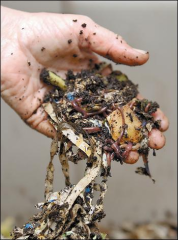Originally published on theTyee.ca.
 A truly cool city would feature a short stroll to the local worm bin.
A truly cool city would feature a short stroll to the local worm bin.
You and I are caring people. And caring people care about composting, which is why many of us bemoan the fact that our civic governments do not collect compost. The well-informed among us may even talk fondly of municipal organic waste collection systems, like those started in San Francisco in 1998 and Toronto in 2004.
But let’s play these municipal collection systems out a bit. First the city gives every household a pricey new plastic rolling tote. They buy additional trucks and hire more people. Those trucks chug up every single lane in the city until they are full, then they drive somewhere far away and dump the organic waste. Large machines pile and re-pile the organics for a few months until it breaks down into compost. They do this two to four times each month, 12 months of the year, for the rest of time.
There’s an obvious environmental cost, and the cash price is none too pretty, either. Take my hometown of Vancouver as an example. The current cost of garbage collection in the Vancouver area is about $15 per tonne. Metro Vancouver collects 1.5 million tonnes of garbage, of which 180,000 tonnes is organic waste.
So the cost of collecting that organic waste, whether in garbage trucks or compost trucks, is $2.7 million every year, plus inflation, wage increases, and fuel surcharges — and speaking of fuel surcharges, diesel has increased in price by 65 per cent this year. Analysts from the investment bankers Goldman Sachs predict oil could spike to $200 per barrel by winter of 2008.
Landfill potpourri
Cities are going to have an increasingly difficult time paying to move garbage from place to place. Something will give, and solid waste is usually the last thing to get a budget cut — people get real cranky when the rats are bigger than the cats. Say goodbye to daycares and libraries.
It doesn’t help that many cities have landfills already overflowing with packaging, construction debris and built-to-break gadgets, and must resort to increasingly tortuous and expensive ways to dispose of their waste. So far, the “best practices” solution seems to be shipping it overseas or to other jurisdictions by train, barge or truck.
Organic waste is a big part of that problem. We truck enormous amounts of food into our cities; in Canada about 1,000 kilograms per person per year. The waste from that food is mind-boggling. A recent report found the U.K. throws away almost a third of its food — and that’s counting only the food that could be eaten, not the piles of peelings and seeds.
So forget about compost? Of course not. You care. And so you care about compost. Composting returns nutrients to the soil. It is part of closing the loop of nutrients; from the soil to us, from us to the soil. As cities increase food security, reconnect with living systems, and increase affordability through urban agriculture, composting will be a critical part of the urban permaculture.
You also care about climate chaos, and composting reduces greenhouse gas emissions from organics rotting in landfills. Methane, a greenhouse gas 27 times more powerful than carbon dioxide, is formed as organic waste decays in airless conditions. Some places burn landfill gas for heat and power generation, but it is not a high-tech system — a big rubber sheet is spread over the dump to collect whatever leaks out. But the garbage bags are still tied shut — organics are mixed with mattresses. The system is far from optimized for methane generation.
Local composting: pick your method
Why not build a composting system that does not rely on a constant river of oil, and start saving part of that $15 per tonne — not to mention lowering our greenhouse gas emissions, cutting down on carcinogenic particulates and reducing the number of noisy trucks waking us in the morning?
To cut back on fossil fuels, everything needs to be on a walkable scale. This will require several kinds of composting systems, depending on the neighbourhood density.
Many cities offer subsidized backyard composters and balcony worm bins, and this obviously needs to continue. Nothing could be better than closing the loop right at home — eat food, compost scraps, spread compost on your garden, eat more food.
The next scale up would require small apartment buildings to compost on site. If a row of three or four backyard composters won’t keep up with the organic flow, small automatic composters use an electric heater to accelerate composting and an auger to automatically turn the compost, producing finished compost in two weeks.
For still larger buildings, industrial scale worm composters can really chew through the food. The Mount Nelson Hotel in South Africa uses worms to make short work of leftovers from the artichoke and asparagus assiette.
But, when I spend some quality time, just me alone with my dreams of composting, I always imagine a neighbourhood bio-digester. This would fit nicely near an intersection, so the residents from the four surrounding blocks can easily walk to it. After you throw your compost in the chute, enzymes and bacteria break it down to produce methane. The methane is burnt in a micro-turbine to generate electricity, which is sold back to the grid. The money raised through energy sales can be used to buy hot dogs and drinks for block parties. The nice thing about this neighbourhood node, other than compost-fueled block parties, is that it would be a logical place to expand into other waste streams like textiles, furniture, brass and steel. It would be helpful if urban planners could start thinking about space for these collection points.
Organic waste: your next career?
Diffusing decomposition into the community creates other opportunities that we wouldn’t get from a fleet of diesel trucks. Right now we have an under-recognized workforce harvesting the nutrient flows of aluminum cans and plastic bottles from our dumpsters. Compost maintenance could provide jobs for those who would like to augment the money they make binning. Traveling by bicycle through the alleys, carrying an aerating tool, these waste technicians could turn your compost and add leaves or grass clippings as necessary. Well-turned compost breaks down faster and hotter, making for fewer flies and better compost. They could also increase the four-block range of the biodigesters by collecting compost from a wider area in bicycle trailers and dumping it into the digester.
So what is it going to be? Shall we build oil-based systems that are doomed from the start, or regenerative systems that can only grow stronger?
